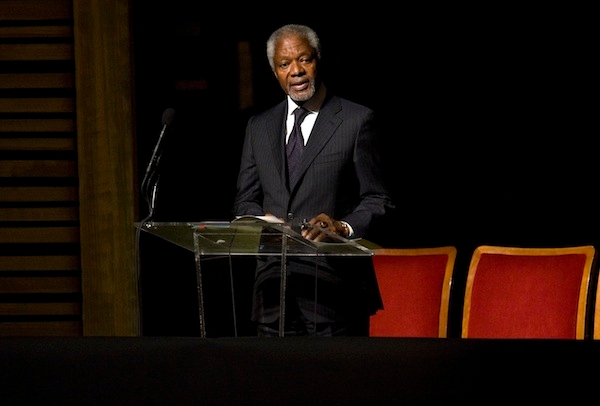This is the end of diplomacy in Syria. Kofi Annan announced yesterday that he will step down as international peace envoy for Syria at the end of this month, highlighting the impotence of United Nations efforts in the country. This effectively closes the main diplomatic avenue by which Western powers have been able to raise their concerns with the regime, signalling the success of Russian and Chinese obstructionism.
Since Annan embarked on his mission in February, Russia and China have used their veto powers in the UN Security Council on three separate occasions to thwart draft proposals put forward by Western and Arab governments to pressure the Assad regime. Instead, Annan was left to hold toothless negotiations with Assad, appealing to the goodwill of an administration that has proved itself willing to kill its own people without restraint.
This explains the failure of Annan’s six point plan. To succeeded, it was reliant on Assad’s willingness to implement it. For a few days in April he did and violence against civilians fell dramatically. But when those civilians, thinking they were now safe, took to streets and called for Assad’s removal, his killing machine stirred back to life with renewed vengeance. In the coming months it would carry out massacres in Houla and Tremseh.
‘The bloodshed continues, most of all because of the Syrian government’s intransigence and continuing refusal to implement the six-point plan,’ Annan said. ‘And also because of the escalating military campaign of the opposition.’
Violence has now intensified across the country with Aleppo, Syria’s second city, now staging a decisive battle between rebels and government forces. The Free Syrian Army (FSA) is growing in determination. Yesterday, after seizing a tank they shelled military barracks on the outskirts of the city. It is the first time the FSA has been able to deploy heavy weapons.
The UN’s presence in Syria was always a Potemkin village, offering an illusion of diplomacy behind which an increasingly sectarian civil war was fought. A bitter turf war has long been raging. Russia and Iran back Assad, while Qatar and Saudi Arabia are busy financing some of the more conservative elements within the opposition. A Ramadan fundraiser led by the House of Saud has already raised just under £100 million for Syria, with King Abdullah himself pledging around £3 million.
Annan’s resignation puts real pressure on Western powers who will feel their attempts to manage the conflict through diplomacy has failed. The United States has already begun discussing the prospect of equipping rebels with surface-to-air missiles, and is working much more closely with Rebel commanders in Turkey than it has in the past.
With the failure of Annan’s mission, what had long been feared but remained unsaid cannot now be ignored; that this conflict will most likely end in military, rather than negotiated, terms.






Comments